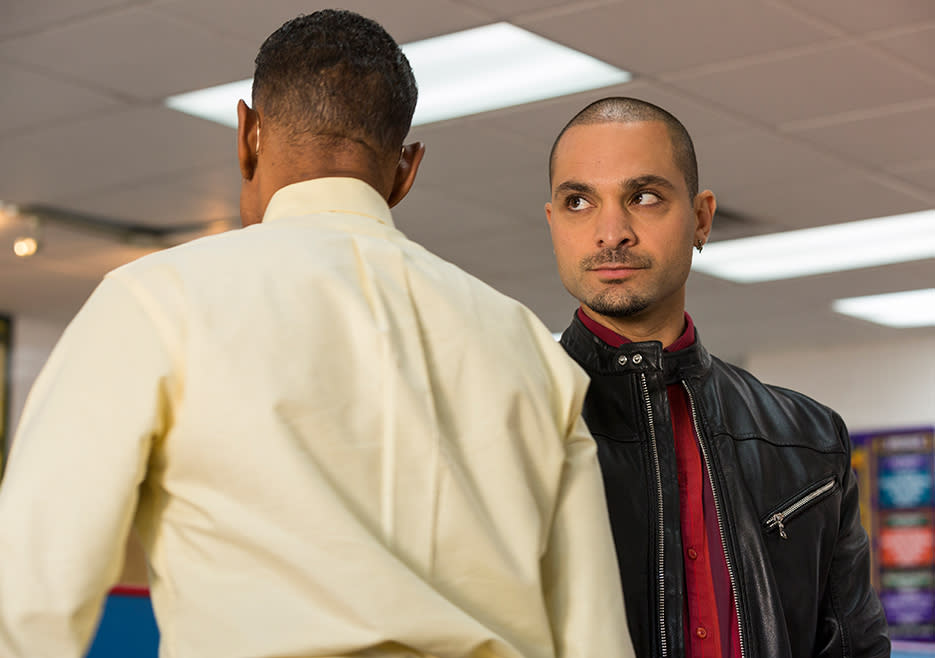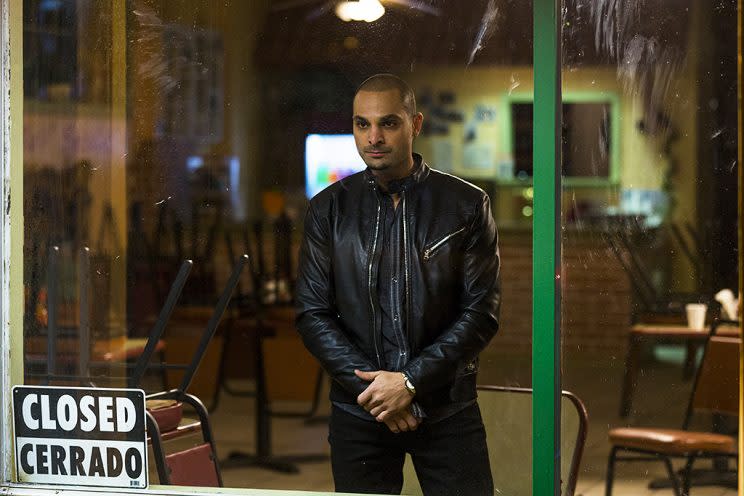‘Better Call Saul’ Postmortem: Michael Mando on Nacho’s Inevitable Showdown and That ‘Breaking Bad’ Mention

Warning: Spoilers ahead for the “Off Brand” episode of Better Call Saul.
Salamanca crime family cohort Nacho has so far been able to keep his cool, even among the most outrageous meltdowns of his bosses Hector and Tuco. But in the Better Call Saul “Off Brand” episode, the plotting Hector — rattled since being outshined by Gus and his success with using Los Pollos Hermanos as a front for his growing drug biz — informs Nacho he wants to take over his father’s small business as a legitimate front for his own arm of Don Eladio’s drug cartel. Nacho argues that his father is a simple man who wouldn’t be interested in such a partnership, but Hector makes it clear he isn’t asking… he’s telling him it’s going to happen.
Yahoo TV talked to Nacho portrayer Michael Mando about how Nacho’s relationship with the volatile Salamancas is about to come to a head, about how Hector’s possibly even crazier nephew, Tuco, might factor into the showdown, as well as what those little green and white pills Hector desperately reached for could mean in the big picture for Nacho.
We also asked him about that Season 2 Breaking Bad mention of a character named Ignacio, and got a potentially exciting hint at Nacho’s future.
We’re really getting into Nacho’s story now, which is very exciting.
Oh, thank you so much. I’ve really gotten to know the character on a different level this year, and I have to say, I’ve become extremely fond of him. I am very attracted to his way of thinking. I find him very mysterious and intriguing, and I find he informs me about myself and teaches me about life in a very interesting and unexpected way.
I think viewers have had that feeling about him, too, since the beginning. We’ve been waiting to get deeper into his individual story.
I think acting is a very strange sort of mirror. On the one end, you want to look deep within yourself. You want to discover the truths and realities and parts of yourself that you didn’t know, or that were parallel to your reality. You hope that the audience will be able to take that journey inwards with you, and that makes me very happy that you said that.

Before we jump into “Off Brand,” I have to ask you about “Sabrosito.” It’s one of my favorite scenes from the whole season so far, a very quick moment when Nacho is walking out of Los Pollos Hermanos, and he stops and looks at Gus. One of the things that sprung from that for me is just how much Nacho is like Gus in all the best ways, that he is patient and he sees the big picture of things, unlike the Salamancas, of course. What do you think Nacho was thinking as he was looking at Gus in that scene?
Any time you put somebody like Nacho, who is very able, who is very capable and dangerous — he’s capable of danger, and he’s very intelligent — in a room with other people who have very big egos, like Tuco Salamanca or Hector Salamanca, you quickly learn by observing that impulsive behavior usually leads to your own detriment. Nacho has learned and has trained himself to be restrained… to be calculating, and what that does is it helps you stay focused on your end goal.
When he notices Gus, there’s an extreme, strong curiosity there, because here is a man who is able to hide in plain sight during the whole time that Nacho [has been] working for the Salamancas. Nacho thinks to himself, here is a drug kingpin capable of restraining his ego and acting full time as a manager of a fast food restaurant. And to pull that off requires focus and a long end game. Nacho recognizes that because he identifies it in himself. It’s almost like life is built on rules. There’s gravity, there’s the atmosphere, but there are other things. There are the seasons, there is such a thing as time and patience, and fortune works in the same similar way. I think he looks over at Gus as someone who has also cracked the code, and that makes him either an extremely welcomed ally or a very dangerous foe.
We get the feeling that, even if he knows of Gus, this is the first time he’s seen that entire picture of Gus. Is that true?
That is what was in the script, yes. When I read [“Sabrosito”], the direction was that this is probably the very first time that he ever comes across Gus. What’s interesting is Nacho has learned to observe people… the way someone stands, the types of shoes that they wear, the car that they drive. Nacho, himself, if you pay attention, gives away a lot of mixed messages in the way he appears. On the one end, he’s got $1,000, $2,000 crocodile boots, but he drives a $400 car. He is a man who is really putting on some kind of a façade or has an end goal that he keeps very close to the chest.

We do assume that everything he does is for a reason. Like his earring.
The snake, yeah. He’s got a snake very close to the ear to remind him of temptation. I would say that Nacho’s biggest dilemma and biggest battle is, he is a young man who at a young age wanted more of life. He wanted to work through that feeling that his father had. His father was an immigrant. Didn’t speak the language. Opened a small shop and is living a very humble life. Nacho was born with that wooden spoon, but deep down, he’s always wanted to be a prince in shining armor. That ambition has led him down the path where he finds himself battling between two fathers. His rich, successful, but extremely vicious cartel dad, and then at the other end there is this God-loving, God-fearing, but unsuccessful biological father. That dilemma is like two currents really crashing inside of him.
Into “Off Brand,” Nacho has a very commanding presence, can be very intimidating. But I also think he’s intimidating in a way that suggests violence is not necessarily his first choice, his first option to deal with things. Again, not true of Hector or Tuco, but in the scene where Domingo is short on the drug money, we get the feeling Nacho does not want to beat him up. He, in fact, says, “Yeah, you can make it up next week.” Hector, of course, pushes him to punish Domingo, too, physically. On his own, would Nacho simply have let Domingo make that up the next week? Would that have been the end of it?
I think Nacho has, in my own backstory, I believe he has looked into his own history. I would imagine he’s South American. He’s got some Mexican blood. I don’t know where his mother is from, but I believe he’s gone and looked up the Mayans and the Aztecs, and I believe that he has an attachment to the land, to nature. And within nature, he sees violence. He sees the way a crocodile would go after the neck of its prey, the way a snake would sting and kill or swallow its prey. He knows that there is violence in this world that has been created before him. I think in some way he understands that there is a time and a place for violence, but I think he is more interested in finding a harmony in that world than in committing to the violence.
I would say SeasonS 1 and 2, Nacho had been very unwilling to dive into that vicious, bloody, criminal world. He’s been walking on the cliff of the civilian world and the underworld. This season, Hector just pushes him off. He’s free falling, and he’s wondering if he’s going to be able to survive the landing. I think what is worse for his soul is he’s asking himself if this world is going to turn him into the monster that he is trying to avoid.
He is clearly frustrated with working the way Hector works. The insanity, the way the Salamancas fly off the handle. Does that have anything to do at this point with the fact that he has seen Gus and he maybe perceives at this point that there is another way of doing things that is at least as successful as Hector’s, if not more?
Nacho has always been frustrated with the Salamancas. In Season 2, he tells Mike a story that dates to five years ago almost, where he says Tuco blew the head off an informant, and Nacho has a piece of that guy’s skull under his skin, his collarbone. There has been this very strong discontent with violence, and I think that also is reflected in his relationship with Mike. He looks at Mike as someone who was probably the best ally that Nacho could hope for. He’s had the experience, he’s very collected, but by the end of Season 2, Mike disappoints Nacho by acting on emotions of revenge. That damages their relationship, because Nacho realizes that Mike, even though he’s highly calculated and intelligent, is also flawed because he could be triggered by emotions, not unlike Tuco, even though they are very different.

Nacho knows now about two of Hector’s big vulnerabilities: Tuco, who has just gotten into more trouble in jail, and those white and green pills that are obviously very important to Hector’s health. Nacho has also just found out Hector wants to drag his innocent father and his father’s upholstery business into the Salamanca cartel. Can we assume that these things are all going to tie together?
I can tell you this: There are very few things that could take Nacho off his end game. Nacho, himself, doesn’t know exactly how he is going to react until Hector mentions his father. There is something in him that just breaks. He is a man who has been, for years, driven by his personal ambition to make something out of himself, and now he finds himself so overwhelmed by the fear of losing his father that he’s willing to throw everything away to save a man that he loves. So, yeah, he’s going to use everything he can because, at this point anyway, it seems that Nacho is capable of unwavering loyalty and unconditional love for his father. Until this point, that is what he seems like to me because messing with Hector’s pills or messing with Tuco is really as close as he can get to flirting with death.
In Season 2 of Breaking Bad, the “Better Call Saul” episode where Saul is in the desert with Walt and Jesse, Saul mentions an Ignacio, which is Nacho’s real name. At this point, do you know for a fact that that reference is going to pan out to actually be Nacho? If not, what do you imagine is true?
I can tell you that I’ve spoken to the writers [about it], and Nacho does stand for Ignacio, and that is the guy that Saul Goodman [was] talking about when he’s in the desert. I can tell you that there is a character called Lalo [the character Saul thinks sent Jesse and Walt after him] that is real, but I don’t know who he is. I don’t know what it stands for. I just know that that is something that is being talked about, but I couldn’t tell you more than that. In other words, what I’m saying is, yes, that is something to hopefully look forward to.
Better Call Saul airs Mondays at 10 p.m. on AMC.
Read more from Yahoo TV:


